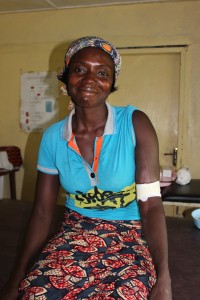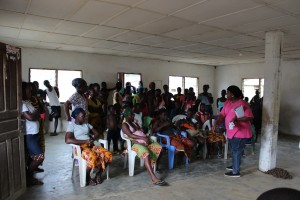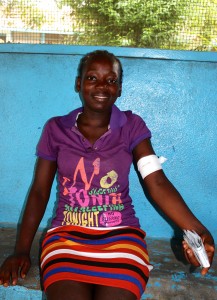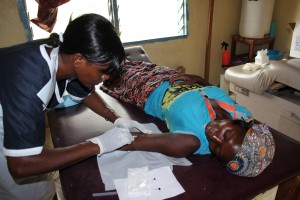Of Liberia’s approximately one million women of reproductive age, an estimated 31 percent want to delay or space their pregnancies but are not using contraception, often because they lack access. Over a quarter of girls aged 15-19 have already given birth, a risky process in Liberia, where the maternal mortality ratio is a staggering 1,072 deaths per 100,000 live births. Together, these facts point toward an urgent need for improved access to modern contraceptives.
Liberia’s Ebola outbreak further compromised access to family planning services. Like many routine and preventive health services, family planning service provision nearly ground to a halt during the height of the Ebola outbreak. Health workers relocated or became sick themselves, service delivery capacity was focused on stemming the epidemic over routine services, and attendance at health facilities declined due to fear of infection. Over the course of 2014, for example, coverage of contraceptive implants, a popular and effective long-acting method in Liberia, declined from 65 percent of facilities providing the service to just 15 percent of facilities by Q4 2014. In the aftermath of the outbreak, the Clinton Health Access Initiative, Inc. (CHAI) is now working to help the Liberian government address critical health gaps and build a more resilient and sustainable health system moving forward, including family planning.
With support from CHAI, Liberia’s Ministry of Health and Social Welfare (MOHSW) conducted local Contraceptive Days in order to expand access to family planning resources and to reboot family planning services in the post-Ebola period. Contraceptive Days are dedicated family planning days generally held at public health facilities in support of their health workers by supplementing them with additional staff, ensuring availability of all necessary supplies, conducting community mobilization activities to raise awareness among potential clients, and enforcing provision of free services. Contraceptive Days can be particularly effective at increasing access to long-acting methods, that are not always available at all facilities and that can take longer to provide. Given the long hiatus of routine family planning service delivery during the outbreak, community mobilization activities conducted as part of Contraceptive Days inform women when and where the services will be available, so they can save time and make the trip to the appropriate health facility with greater certainty that the service they need will be available on demand, and with a shorter wait time. In this way, Contraceptive Days provide targeted service delivery while supporting the re-establishment of routine service delivery for family planning.

Historically, Contraceptive Days have been implemented by partners, in some cases with little involvement by the MOHSW; however, CHAI has supported the MOHSW to implement these activities directly and institutionalize Contraceptive Day activities as a service delivery option for County Health Teams (CHTs) around the country. CHAI has helped the MOHSW to create a Contraceptive Days toolkit with guidance for planning, budgeting, quantifying likely client loads and commodity needs, and implementing Contraceptive Days, and is now providing hands-on technical assistance to ensure full ownership and capacity by CHTs. For example, CHAI and the MOHSW recently supported the Bomi CHT in western Liberia to conduct a Contraceptive Day in the four districts of Suehn-Mecca, Senjeh, Dewoin, and Clay over three days. In this rural county not far from the capital city of Monrovia, women in Bomi County had previously been some of the largest users of contraceptive implants, but these numbers declined precipitously during the outbreak.
The Bomi CHT led the coordination of the event with support from the Family Health Division of the MOHSW, in line with the government’s goal to decentralize these activities to the county level. CHT-hired community mobilizers raised awareness of the Contraceptive Day services available while distributing condoms in the target districts during the days leading up to the event with a radio phone-in show, visits to markets and other public places, and community-based group discussions, among other strategies. CHAI provided technical support during the pre-planning phase by working with the CHT to develop an activity plan, quantify the commodity and consumable needs for the event, assemble the team of service providers, and mobilize the community.

During the event, health workers provided group counseling to all women in attendance, explaining all available family planning services and responding to questions. Health workers sought to dispel widespread myths and misconceptions about family planning methods with direct discussions. Potential clients had the opportunity to ask questions in the group setting as well, such as what methods were available to women who had just given birth, or what side effects were experienced with a particular method.
Following the group sessions, women who opted to receive any form of contraception participated in individual counseling sessions. In these sessions, women were encouraged to talk more freely about their own personal situations, needs, and preferences. Family planning services—including male and female condoms, cycle beads, pills, injectables, and implants—were then provided to women based on their preference. In particular, the inclusion of implants is critical to providing choice to women, as implants are not routinely available at all service delivery points. Those who opted to receive an intrauterine contraceptive device (IUCD) or sterilization were referred to a nearby hospital due to limited infrastructure and space at the facilities hosting outreach.
Jartu Holmes, a 28-year old woman with three children, attended the event at Bomi County Hospital on June 3. She is newly single and has not previously used a contraceptive method, but wants to keep her options open to potentially have more children in the future. After discussing her options with Certified Midwife Sarah Mentee, Jartu decided to have the Jadelle implant inserted. She also took home condoms for dual protection.

At another Contraceptive Day event on the same day at the Sasstown Clinic in the town of Be Sali, Bomi County, 32-year old Tryphosa Karbel brought her 6-month old son with her. During an individual counseling session, Certified Midwife Mary Ngabe presented Typhosa with the different contraceptive options; Typhosa also elected for the Jadelle implant. The implant’s long-term protection was particularly important in her decision, as she values her independence and wants to ensure she is able to take care of her child on her own if necessary.

In total, during the three-day event from June 3-5, 1,546 women received their contraceptive method of choice. Among the women who sought family planning services, 55 percent opted for injectable contraceptives, 23 percent obtained pills, and 21 percent chose implants. In addition, both male and female condoms were distributed through the campaign. The significant proportion of women choosing implants reflects the important role of the outreach event in providing access to a popular method that is not routinely available at all health facilities, and had been particularly difficult to access during the Ebola outbreak. In Bomi County as a whole, about 45 implants were generally provided over any three day period prior to the Ebola outbreak through traditional service delivery points; the Contraceptive Day event in just four districts was able to reach nearly seven times that number of women with implants. The majority of clients were new acceptors of family planning.
CHAI aims to ensure that the government of Liberia can sustainably implement Contraceptive Days moving forward. By taking on a predominately supervisory role, CHAI allowed the local government to utilize its service delivery and mobilization expertise, while providing support in the form of financial and technical assistance, hand-in-hand with the Bomi CHT. Going forward, the CHT will be able to draw on their experience from this event to conduct Contraceptive Days on their own. Importantly, at a cost of only about US$2 per client, Contraceptive Days can be incorporated into even limited county budgets.





